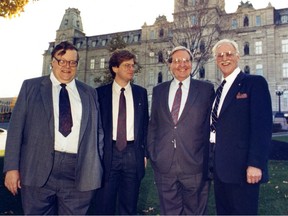While anglo angst persists, the political circumstances today are very different for minority-rights groups.

Article content
This past Wednesday marked 35 years since the surprising Quebec election night breakthrough of the Equality Party. People of a certain age may remember how I, along with Gordon Atkinson, Richard Holden and Neil Cameron, who have all since passed away, swept four predominantly anglophone ridings in the western part of Montreal. The party finished second in several ridings, coming very close to winning a fifth seat.
Advertisement 2
Story continues below
Article content
In the 1980s, non-francophones were feeling increasingly marginalized politically, much as today with language tensions simmering again since the 2018 election of the Coalition Avenir Québec government.
But can history repeat itself for a minority-rights party to make any headway?
While the angst persists, the political circumstances today are very different. In 1989, the governing Liberals — the traditional party of the anglos — became the villains themselves, having spectacularly reneged on a promise to the community when premier Robert Bourassa invoked the notwithstanding clause to quash a Supreme Court ruling that prohibiting English on commercial signs violated fundamental rights. Three Liberal ministers subsequently resigned.
The separatist Parti Québécois was the only alternative in the National Assembly, so we felt we could capitalize — though we still had to tirelessly explain that voting for Equality in federalist ridings would not split the vote and indirectly help the PQ.
We also had to counter admonitions by the anglo community establishment that the cause would be better served by politicians working from within the Liberal party. We believed that strategy had failed, and it was critical at that moment in time for the community to stand up.
Advertisement 3
Story continues below
Article content
We felt a new political vehicle was the best way to send an unequivocal message, and considerable legwork was required in the year before the election to build organizations at the riding level to ensure we got the vote out. We, in fact, never expected to be elected. But the grassroots community was really angry and responded overwhelmingly.
On election night, the shock waves prompted some francophone opinion leaders to recognize that maybe the government had gone too far, and a few years later the Liberals actually decided not to renew the notwithstanding clause and walked back the provisions of the language law that got us elected.
Since then, the Liberals have been inconsistent on language matters — flip-flopping on elements of Bill 96, for example — but have been active in calling out the CAQ government on access to English services, particularly in health care.
It will be critical to see where their soon-to-be-chosen leader stands on the language spectrum, whether moderate or more hawkish. If elected, they will be unlikely to reverse any language laws or other damage done by the CAQ, but the anger toward them is not as palpable as it was back then. The opposition is also more fractured now, with some anglophones enticed by Éric Duhaime’s Conservatives, who have made flirtatious advances.
Advertisement 4
Story continues below
Article content
Some of the new groups that have emerged, such as the Task Force on Linguistic Policy, Bridging Ethnic Communities and the Canadian Party of Quebec (CaPQ) — which had limited success in the last election — are providing valuable service by keeping issues at the forefront.
But for a party like the CaPQ to succeed, they cannot rely solely on anger or protest. They must redefine the narrative, by better linking the language issue and nationalism to its impact on everyone’s economic well-being. Montreal, largely due to our provincial politics, has suffered for generations. Voters of all languages are exasperated. Whenever I’ve broached the subject of a new economic paradigm for Montreal — recognition as a “city-state,” for example — where bilingualism and openness are embraced and not shunned, there has been significant reaction and interest.
It won’t happen tomorrow, but a discourse that starts now — giving hope about a different model and relationship between Quebec and Montreal — is an avenue for a young party to explore and potentially distinguish itself.
In 35 years from now, hopefully it will have made a difference.
Robert Libman is an architect and planning consultant who has served as Equality Party leader and MNA, mayor of Côte-St-Luc and a member of the Montreal executive committee. X @robertlibman
Recommended from Editorial
Advertisement 5
Story continues below
Article content
Article content



Comments